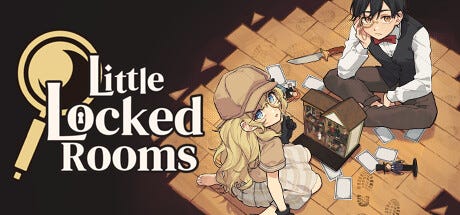4 New Games from the Mystery Gamedev Community
Plus a review of the now released Little Locked Rooms
Happy Mystery Monday!
Today we’ll be doing a quick roundup of games and demos from devs in our community, including a full review of a recently released game!
The Specter’s Desire
This year's Desire Hierarchy has begun. The stakes are now deadly. Hop into The Specter's Desire, a Visual Novel in which you play against the city's top talents to save your parents. Includes puzzling gameplay that has you tearing down arguments, hatching schemes, and revealing the truth!
The latest game from the creator of The Zodiac Trial is now available on Steam! The game contains over 40 hours of content, including a variety of minigames and Ace Attorney inspired gameplay.
Reflection Link
Seven sinners awaken within the Moirae facility, where a mysterious figure informs them that the path to freedom will open only when they confess. Explore with escape room style puzzles, lead discussions, and uncover the secrets they desperately wish to hide in this branching path visual novel.
The Steam page, trailer, and demo for Reflection Link is now live! The demo contains 3 to 5 hours of escape-room style puzzles, interactive discussions, and branching storylines. It also contains partially voiced English dialogue!
If that sounds exciting, add it to your wishlist here.
Underworld Blues: The Chameleon’s Dish
Nobody expects Andrea Laiver to actually solve a year old murder. With a trail this cold, it would take a minor miracle. Plus, solving murders isn't exactly her primary stock-in-trade.
That said, it's not like anybody told her NOT to at least try. Whether or not the death of Michael Quinlan, a mild mannered college town librarian, amateur alchemist, and collector of minor oddities, was in any way related to his unusual interests, Andrea can't seem to help her own curiosity.
This game was one of the submissions to the Mystery Game Jam.
The demo/prototype contains about 2 hours of gameplay as you go around talking to characters, learning about the details of the case in your database, and crafting theories using a unique theory-parsing system.
It’s worth noting that the game’s creator is running a crowdfunding campaign with just under 3 weeks remaining, so if you enjoyed the demo and want to see more, consider chipping in before time runs out!
Little Locked Rooms
Disclaimer: We received a free Steam key for review purposes. If you’re the developer of an upcoming mystery game you’d like to see reviewed in our newsletter, please reach out.
Grab your magnifying glass and peek inside a series of tiny dioramas filled with crimes and carefully crafted mysteries! Think outside the box and solve them all in this new brand of detective game!
You might remember this game from my coverage of its demo in October. Well, how time flies! The full game was released just a few days ago, and I’m here to give you my final thoughts on it now.
Locked room / impossible crime mysteries are my favorite kind, because they really challenge you to think about what’s possible. These are mysteries that seemingly couldn’t have taken place, but always have a realistic and satisfying answer. So a whole game filled with these kinds of puzzles (and very clearly inspired by some Golden Age classics) instantly had me interested.
While this game technically has six chapters, there are really only four different mysteries — two of the chapters are “hard mode” versions of previously solved mysteries. I actually think this is a really cool idea, because it forces you to think more deeply to find more elegant solutions. More mystery games should do this.
You solve each mystery by answering a series of multiple choice questions. The answers to these questions are deduced by looking at each crime scene’s 3D diorama and pointing to the clue that answers the question. Sometimes there are multiple dioramas to show different rooms in the same scene. Little figures of people move around the dioramas, acting out the player’s theories. A lot of effort was put into showing off just the right camera angle and animating all the 3D models correctly to create each and every theory — even the wrong ones.
In fact, a lot of effort was put into the “wrong answers”, so even when you guess incorrectly, it doesn’t feel like a waste of time. This is nice, but it comes into conflict with the game’s ranking system, which encourages you to not take any hints or guess anything incorrectly. However, getting a high rank doesn’t actually unlock anything (not even any Steam achievements), so you can just as easily enjoy the game without worrying about perfection.
When I played naturally (and without hints), I ended up with a B rank on nearly every chapter. But I think the game could be a little more lenient, because taking even a single hint will drastically reduce your score. That said, I think the solutions were all fair and solvable. I only had issues with the ambiguity of my choices, so I tried a few options not knowing with total certainty if they would work. I think the ideal way to play is to very carefully consider your answers, because it is definitely fair, but just don’t worry too much about getting a perfect score.
Each mystery uses faceless and nameless characters that are unique to each chapter. There is a bit of a meta-story involving a father and two kids, who are playing with the dioramas. But it doesn’t do a whole lot, and can be mostly ignored if you just want to solve some puzzles, which are the focal point of the game anyway.
The sprites are well-drawn, but lack a variety of facial expressions. The 3D models are nicely crafted with simple textures, and they work well for a very cozy style.
The music is generally calm or slightly upbeat, and it never gets old because it naturally changes on its own (or is just one very long and varied track). It never really gets too tense or dramatic, but maybe that’s to keep up the cozy atmosphere.
The UI/UX was very intuitive, and it was nice to be able to jump between rooms from the menu during the prompts instead of navigating around the map.
Apparently this is the developer’s first release, but it plays like a highly polished experience, so it is definitely a job well done.
Overall, Little Locked Rooms is a short but satisfying experience. It took me just under 4 hours to solve all the mysteries. Each chapter can easily be completed in a roughly 30 minute session, so you can either play the whole game in one afternoon, or savor each mystery one bite at a time.
Still, this kind of game is begging for more content, so I hope there is some kind of DLC or sequel where the diorama system is put to good use again.
If you think you’d enjoy using your little grey cells on some Little Locked Rooms, you can purchase the game here.
Thanks for reading!
If you want to learn how to make your own mystery game…
Or if you want to discover the best mystery games before anyone else…
Join our 300+ member Mystery Gamedev community today!
And please consider sharing our newsletter with a friend — we appreciate it!









